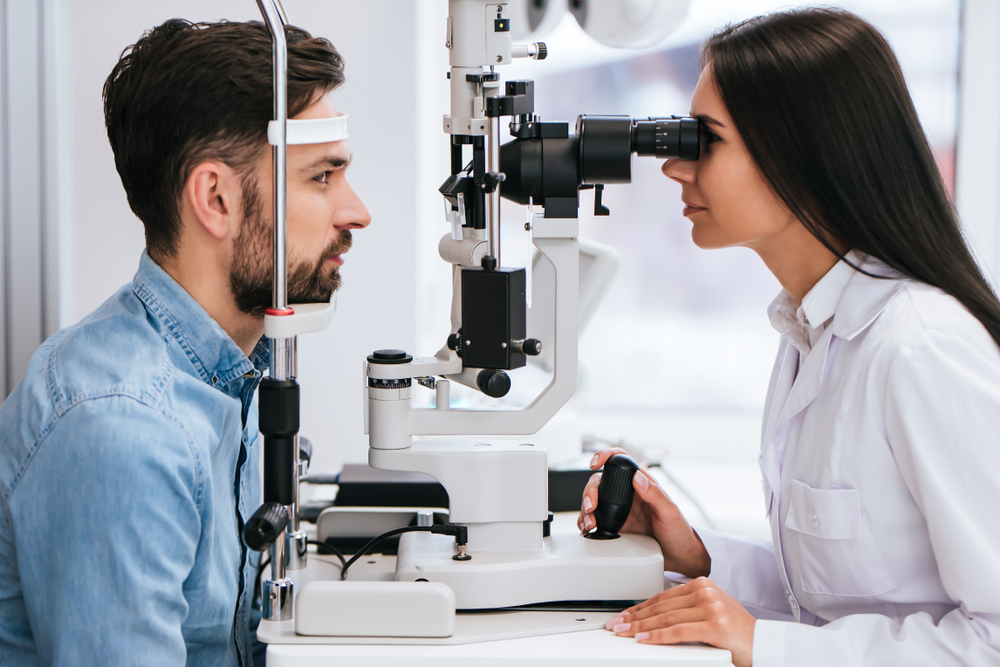If you’ve been dealing with burning, gritty, or watery eyes, you may have wondered whether you need to see a specialist. The truth is, if over-the-counter eye drops aren’t giving you lasting relief, or if your symptoms are interfering with daily activities like reading or driving, it might be time to consider specialized care that goes far beyond what a standard eye exam can offer.
Keep reading to learn more about dry eye and what a dry eye specialist does!
What Exactly Is Dry Eye?

Before we dive into what makes a dry eye specialist different, it’s important to understand that dry eye isn’t just about having “dry” eyes. In fact, many people with dry eye syndrome actually experience excessive tearing.
This might seem contradictory, but it makes sense when you understand how your tears work. Your tear film is like a sophisticated three-layer system that does much more than just keep your eyes moist.
It cleans your eyes, fights infection, nourishes your cornea, and even serves as an important optical surface for clear vision. When this system isn’t working properly, you might experience symptoms like:
- Burning or stinging sensations
- Gritty feeling, like there’s sand in your eyes
- Red, irritated eyes
- Light sensitivity
- Blurred or fluctuating vision
- Difficulty wearing contact lenses
- Eye fatigue, especially when reading or using computers
The challenge with dry eye is that it can present very differently from person to person, and what you’re feeling doesn’t always match what a general eye doctor might see during a routine exam. This is where specialized care becomes crucial.
What Makes a Dry Eye Specialist Different?
A dry eye specialist is an eye care professional who has dedicated significant time, training, and resources to understanding and treating this complex condition. While your regular eye doctor is excellent for routine eye care and detecting general eye problems, a dry eye specialist brings several key advantages:
Advanced Diagnostic Technology

Diagnosing dry eye properly often requires more than a basic eye exam. Dry eye specialists use sophisticated testing equipment that can analyze different aspects of your tear film and eye surface.
At facilities like the Dell Eye Institute for Dry Eye Research, specialists use advanced tools, including:
- Infrared imaging to visualize the oil-producing glands in your eyelids
- Digital analysis of your tear film’s lipid (oil) layer
- Tear osmolarity testing to measure the salt concentration in your tears
- Specialized staining techniques to assess eye surface damage
- Biomarker testing to detect inflammation
These tests help identify the specific type of dry eye you have and what’s causing it, rather than just treating symptoms.
Understanding the Root Causes
There are multiple types of dry eye, each requiring different treatment approaches. The most common form is caused by problems with the oil-producing glands in your eyelids.
Other forms involve insufficient tear production or issues with the mucin layer that helps tears stick to your eye surface.
A dry eye specialist can determine which type or combination of types you have and address the underlying cause rather than just providing temporary relief.
Access to Advanced Treatments
While artificial tears are often the first recommendation for dry eye, they typically provide only temporary relief and don’t address the root problem. Dry eye specialists have access to cutting-edge treatments that can provide longer-lasting results:
Intense Pulsed Light (IPL) Therapy: IPL has become one of the most effective treatments for dry eyes. This light-based therapy improves the function of oil-producing glands and reduces inflammation around the eyelids.
Advanced Gland Expression Treatments: Technologies like TearCare and LipiFlow use controlled heat and pressure to unclog blocked oil glands, restoring natural tear film function.
Prescription Medications: Specialists can prescribe anti-inflammatory drops like Xiidra, Cequa, and Restasis that help your eyes produce more natural tears and reduce inflammation.
Minimally Invasive Procedures: Treatments like punctal plugs (tiny drain stoppers for your tear ducts) and specialized eyelid treatments can provide significant relief with minimal discomfort.
Personalized Treatment Plans
Perhaps most importantly, dry eye specialists understand that no two patients are exactly alike. They develop individualized treatment plans based on your specific type of dry eye, severity of symptoms, lifestyle factors, and treatment goals. This personalized approach is much more effective than a one-size-fits-all solution.
When Should You See a Dry Eye Specialist?
You might benefit from seeing a dry eye specialist if you:
- Have persistent dry eye symptoms despite using over-the-counter drops
- Experience symptoms that interfere with daily activities like reading, driving, or computer work
- Have been told you need to address dry eye before LASIK or cataract surgery
- Deal with contact lens intolerance due to dry eyes
- Have underlying conditions like rosacea, autoimmune diseases, or hormonal changes that may contribute to dry eye
- Want to explore advanced treatment options beyond artificial tears
Are You Experiencing Dry Eye Symptoms?

If you’ve been struggling with dry eye symptoms, seeing a specialist might be the best course of action. Think of it as adding a team member who has specialized expertise in this complex condition.
The goal of any dry eye treatment should be to help your body produce more of its own healthy tears rather than just providing temporary artificial lubrication. A dry eye specialist has the knowledge, tools, and treatment options to help you achieve this goal.
As the only comprehensive dry eye clinic in Central Texas, Dell Laser Consultants has established itself as the regional leader in specialized dry eye care and treatment.
Ready to find relief from your dry eye symptoms? Schedule an appointment with the dry eye specialists at Dell Laser Consultants in Austin, TX, today!





